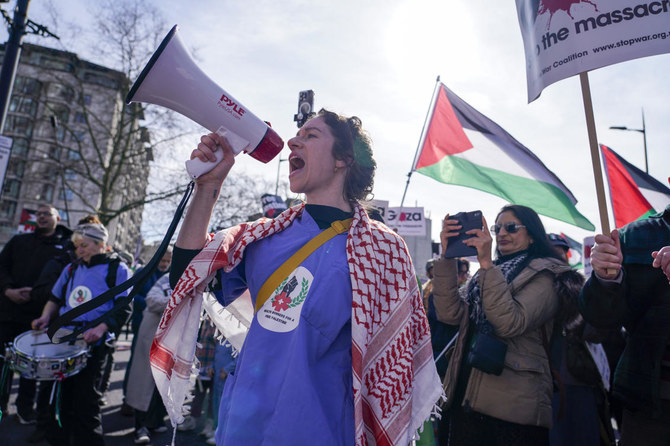LONDON: Thousands of protesters marched in central London on Saturday to call for a ceasefire in Gaza amid ongoing bombardments by Israel after the deadly Hamas attack on its territory on October 7.
Regular marches protesting Israel’s military response to the attacks have seen dozens arrested for anti-Semitic chanting and banners, promoting a proscribed organization and assaulting emergency workers.
The march, from Hyde Park Corner to the US Embassy, was the fifth major demonstration of the year so far in the capital.
“We will continue to protest until a ceasefire is called, and until there is an end to all UK complicity with Israel’s decades long oppression of the Palestinian people,” march organizer Ben Jamal said ahead of the protest.
“Despite further attempts by government ministers, including the prime minister, to demonize those protesting and suppress calls for a ceasefire, hundreds of thousands will again be taking to the streets, calling for an end to Israel’s genocidal war on the Palestinian people,” said Jamal, who is director of the Palestine Solidarity Campaign.
PSC added: “Coming just after International Women’s Day, the focus will be on what the UN Women organization describes as an unprecedented ‘war on women’.”
Last week Prime Minister Rishi Sunak called for the police to take tougher action against the protesters, saying the events “had descended into intimidation, threats and planned acts of violence.”
The prime minister said that “police have a tough job in policing the protests” but that “we must draw a line.”
“I say this to the police, we will back you when you take action,” he added.
Itai Galmudy, the organizer of a counter-protest on Saturday, said pro-Palestine demonstrations had created “no-go zones for Jewish people” in the capital and “ballooned into anti-Israeli hate marches.”
“We will just not accept that Jews can’t go out in the street because somebody wants to protest,” he said.
“We think it’s enough. We don’t want to live in fear and we will not accept it.”
London’s Metropolitan Police have also criticized the protests, saying the cost of policing such events had reached £32.3 million ($41 million) since October 7.
“We are clearly operating in a context where we understand our Jewish and Muslim communities continue to be highly concerned about antisemitic and anti-Muslim hate crime and their own sense of safety in London,” said Karen Findlay, who oversaw policing across London on Saturday.
On Friday a pro-Palestinian UK protest group said one of its activists had “ruined” a portrait on display of Arthur Balfour, the British politician whose declaration helped lead to Israel’s creation.
Police confirmed officers had received an online report of criminal damage to a painting at the University of Cambridge’s Trinity College, in south-eastern England.
Palestine Action, which describes itself as a direct-action network of groups and individuals, posted video footage online of the activist spraying the artwork with red paint from a cannister and then slashing the surface of the framed painting multiple times.
The Balfour Declaration was a 67-word letter in 1917 from Britain’s then-foreign secretary to Lionel Rothschild, a prominent British Zionist, supporting the creation of a Jewish homeland in Palestine.
The document is credited with eventually helping to spur the creation of Israel in 1948, which also led to the displacement of around 750,000 Palestinians and decades of strife between the two communities.
The war in Gaza began after Hamas launched an unprecedented attack on southern Israel that resulted in about 1,160 deaths, most of them civilians, according to an AFP tally based on official Israeli figures.
Militants also took around 250 hostages. Israel believes 99 of them remain alive in Gaza and that 31 have died.
Israel’s retaliatory offensive has killed at least 30,717 people, mostly women and children, according to Gaza’s Hamas-run health ministry.
(With AFP)




























